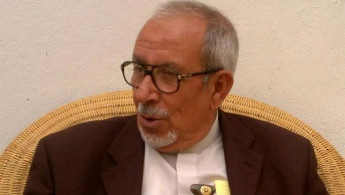Yemen Red Crescent founder dies after being denied treatment amid Saudi blockade
It is believed that Abdullah Alkhamesi, 76, could have survived his condition had he been given acces to vital medical care currently unavailable due to the Saudi-led military coalition's blockade on parts of Yemen.
Alkhamesi's heart surgery required stents - expendable tubes placed in narrowed arteries - which are currently in short supply and sold for inflated prices in Yemen. Seeking treatment abroad was also ruled out due to the blockade.
"First, [the hospital] could not find the stents. [Then] they found one and they found another one, and they bought some from an Indian nurse. Stents cost them $1,000, it is just crazy. It is massive money in Yemen," Zubair Alkhamesi told The Guardian.
"They collected all of them, they made the operations and then the doctor said he needed more, but they didn't have any more.
"He got the stents but he did not get better, since then he deteriorated and there was no way to get him out to Cairo, or Amman, the queue was very long, there is a queue for names for patients, the Saudis have stopped the planes," he added.
Born in 1941, Alkhamesi was part of the first group of around 30 people sent to Russia by Imam Ahmad bin Yahya, the former Yemeni ruler, to train as a doctor. After founding Yemen's Red Crescent in 1973, Alkhamesi served as the aid organisation's general secretary until the early 2000s.
He also once served as chairman of the Yemeni doctors' union.
Healthcare collapse
Yemen's ongoing war has brought the country's healthcare system to the brink of collapse, with the Saudi-led coalition permitting less than a dozen humanitarian flights landing in Aden and capital Sanaa per week.
The UN says that some 20,000 patients have lost access to critical treatment due to the closure of Yemen's main airport.
Zubair Alkhamesi says he holds the key members of the Arab military coalition - Saudi Arabia and the UAE - directly responsible for his father's death.
"You are angry, you cannot do anything, because it is not the people's fault ... it is the king of Saudi and the [emir] of Emirates, they are all playing politics, they have destroyed the whole country," Zubair said.
"Of course, he died because of lack of access to life-saving medicine. It is very hard to get anything in Yemen now... You have to go and bribe the people and find everything through the back door, everything is very, very expensive, doctors would say buy this now and go sometime and it would take you a week to find this medicine," he added.
The Saudi military coalition intervened in Yemen's war in March 2015 in an attempt help the country's embattled president, Abedrabbo Mansour Hadi, against Iran-backed Houthi rebels.
Yemen's war has seen more than 12,000 killed in ongoing fighting between pro-government forces and Houthi rebels. The war has wrecked Yemen's infrastructure, facilitated an outbreak of cholera and brought the country to the brink of collapse.





 Follow the Middle East's top stories in English at The New Arab on Google News
Follow the Middle East's top stories in English at The New Arab on Google News


